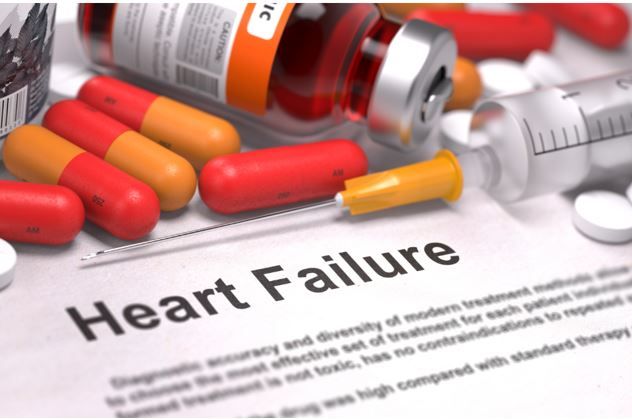- CDC
- Heart Failure
- Cardiovascular Clinical Consult
- Adult Immunization
- Hepatic Disease
- Rare Disorders
- Pediatric Immunization
- Implementing The Topcon Ocular Telehealth Platform
- Weight Management
- Monkeypox
- Guidelines
- Men's Health
- Psychiatry
- Allergy
- Nutrition
- Women's Health
- Cardiology
- Substance Use
- Pediatrics
- Kidney Disease
- Genetics
- Complimentary & Alternative Medicine
- Dermatology
- Endocrinology
- Oral Medicine
- Otorhinolaryngologic Diseases
- Pain
- Gastrointestinal Disorders
- Geriatrics
- Infection
- Musculoskeletal Disorders
- Obesity
- Rheumatology
- Technology
- Cancer
- Nephrology
- Anemia
- Neurology
- Pulmonology
SGLT2 Inhibitor Use Improves Quality of Life, Functional Capacity in Patients with Heart Failure
Patients with HF who received SGLT2i therapy had significant improvement in functional capacity and QOL, regardless of sex, diabetes status, or ejection fraction, report researchers.

Patients with heart failure (HF) who received sodium glucose cotransporter-2 inhibitors (SGLT2is) had significant improvement in functional capacity and quality of life (QOL), regardless of sex, diabetes status, or ejection fraction, according to a recent study published in JAMA Network Open.
Specifically, findings from the systematic review and meta-analysis of patients with HF showed that SGLT2i therapy was associated with significantly higher performance on all 5 functional capacity and QOL end points evaluated, including peak oxygen consumption (peak VO2), 6-minute walk distance (6MWD), and QoL as measured via validated questionnaires.
“These findings suggest that SGLT2i therapies should be considered for improving functional capacity and QOL in addition to reducing the risk of hospitalization and mortality among patients with HF,” wrote researchers from the Icahn School of Medicine at Mount Sinai, in New York, NY.
Patients with HF have higher rates of hospitalization and mortality, and experience limitations in their functional capacity and QOL, according to the study. SGLT2is are the newest class of medications to be recommended for patients with HF “based on the results of several large randomized clinical trials (RCTS) demonstrating reduced cardiovascular mortality and HF hospitalizations with their use,” investigators noted.
Less is known, however, about the association between SGLT2is and improved functional capacity and QOL among those with HF. To gain more insight, researchers performed a literature search in the Medline, EMBASE, and Cochrane databases for relevant RCTs published until July 31, 2023, that focused only on nonpregnant patients aged 18 years and older with HF.
According to the study, QOL was assessed using the Kansas City Cardiomyopathy Questionnaire-12 (KCCQ-12), which evaluates various aspects of QOL in patients with HF, including physical limitations, symptom frequency, QOL perception, and social limitations.
Main outcomes included change in peak VO2, 6MWD, KCCQ-12-total symptom score (TSS), KCCQ-12 clinical summary score (KCCQ-CSS), KCCQ-12 overall summary score (KCCQ-OSS), and the proportion of participants with small (≥5 points), moderate (≥10 points), or large (≥15 points) improvement in KCCQ-12 scores at the end of the study.
Findings
The analysis included 17 RCTs with 23 523 patients (mean age, 69 years), of whom 36% were women and 46% had type 2 diabetes. The mean left ventricular ejection fraction (LVEF) was 43.5%, and follow-up ranged from 12 to 52 weeks, according to the study.
Exercise capacity assessment. A total of 4 studies including 250 participants with HF with reduced ejection fraction assessed peak VO2, with a follow-up of 3 to 6 months. Use of SGLT2i therapy was associated with significant improvement in peak VO2 compared with placebo (mean difference [MD] 1.61 mL/kg/min, 95% CI 0.59-2.63; P = .002), and the heterogeneity between studies was moderate.
Seven trials including 1457 participants evaluated 6MWD, with follow-up ranging from 3 to 6 months. Pooled results showed that patients who received SGLT2i agents walked over 13 more meters compared with a control group (MD 13.09 m, 95% CI 1.20-24.97; P = .03). Researchers did not observe a significant subgroup interaction in outcomes by baseline LVEF (Pinteraction = .88), SGLT2i used (Pinteraction = .70), or follow-up duration (Pinteraction = .47).
QOL analysis. Ten studies including 17 703 participants examined KCCQ-TSS scores and 9 studies with 17 598 patients evaluated KCCQ-CSS and KCCQ-OSS scores, with follow-up time ranging from 3 months to 1 year. Participants who received SGLT2i medication had a significantly increased mean change in KCCQ-TSS score (MD 2.28, 95% CI 1.74-2.81; P < .001), KCCQ-OSS score (MD 1.90, 95% CI 1.41-2.39; P < .001), and KCCQ-CSS score (MD 2.14, 95% CI 1.53-2.74; P < .001) compared with individuals who received placebo.
“Meta-regression analysis revealed that most improvements in functional capacity outcomes seen with SGLT2i use were not associated with sex or baseline diabetic status” researchers reported. “However, an inverse association between proportion of patients with type 2 diabetes type and improvement in 6MWD with SGLT2i treatment was observed.”
The limitations to the current study include the fact that outcomes were analyzed at the study level and so lacked individual patient data. Also, the number of trials investigating peak VO2 were limited. The potential impact of sotagliflozin was not included because of a lack of functional capacity assessment and early termination, which may limit the understanding of sotagliflozin-specific effects on QOL.
Reference: Gao M, Bhatia K, Kapoor A, et al. SGLT2 inhibitors, functional capacity, and quality of life in patients with heart failure: A systematic review and meta-analysis. JAMA Netw Open. Published online April 1, 2024. doi:10.1001/jamanetworkopen.2024.5135
